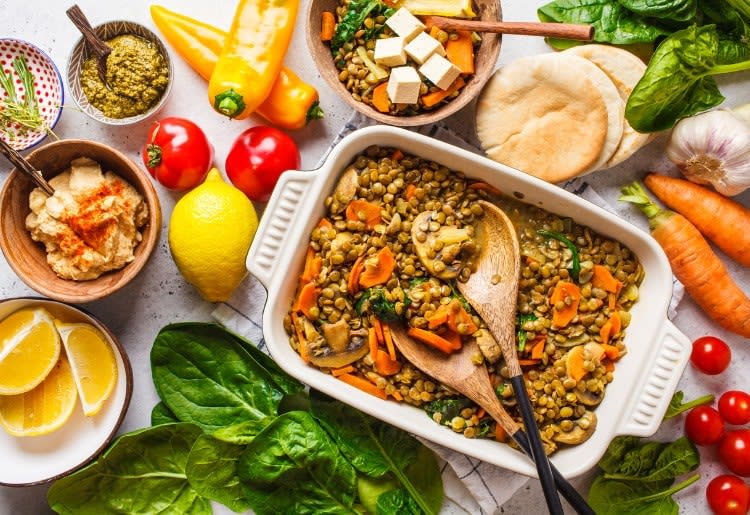What the Vegetarian Diet is All About
To begin with, a vegetarian diet isn’t just for extremists, tree huggers, or animal rights activists. While many vegetarians might fit into one of those categories, even your average Joe Schmo might be vegetarian given the many benefits this type of diet offers.
Now that that's clarified let's dig a little deeper into what the vegetarian diet entails. There's a common misconception that a vegetarian has an extremely restricted diet. Obviously, this type of regimen is based mainly on vegetables, but don't think you'll be condemned to eating salad for the rest of your days. As a matter of fact, the vegetarian diet consists of thousands of different kinds of foods. Here are some of the better options:
- Nuts and seeds
- Fruits
- Vegetables
- Dairy products
- Eggs
- Tofu
- Grains

While a vegetarian diet does not specify quantities, types, and cooking methods, anyone looking to lose weight on this type of diet would do well to follow a more structured menu plan. For example, according to the vegetarian diet, you can eat any grains you want. If you want to lose weight though, you should limit yourself to whole grains. According to the strict definition of the vegetarian diet though, you can eat any type of grains you want.
Once you lay it all out on the table (literally!), you see that there isn’t much that you can’t eat as per this lifestyle. The only thing you have to avoid on a vegetarian diet is animal meat. This includes:
- Meat
- Poultry
- Fish
Not too bad, huh?
Why the Vegetarian Diet is Around
As mentioned, there are several reasons why someone might choose to become a vegetarian. Here are a few of them:
Cuts Out the Fat
Animal meat might be tasty, but it is also loaded with fat and not the good extra-virgin olive oil type either. Eating a steady diet of meat products means you're bringing a lot of saturated fat into your body. This means your heart and other organs have to work extra hard to break down the fat, process it, and dispose of it.
Packs in way more nutrients
No matter how you slice it (get it?), vegetables offer you far more nutrition than other food categories. So, a diet that is primarily sourced in vegetation will naturally deliver nutrients that other diets simply cannot provide (at least in the same quantities). The vegetarian diet promotes large helpings of fruits and vegetables every single day, as well as nuts, seeds, beans, legumes, and whole grains. So, you are really fueling your body with the best that Mother Nature has to offer.
A Kinder Kind of Diet
We won’t go into detail about how animals are treated, raised, and housed when their destination is your dinner table. However, if you are an animal-lover or someone who doesn’t care to take part in the inhumane treatment of animals, then vegetarianism is the only way to go. Notwithstanding, the vegetarian diet is also better for the environment.
Helps you lose weight
Studies have shown that people who stick to a vegetarian diet lose more weight and keep it off longer than omnivores. Obviously, you can live off of a steady diet of potato chips, deep-fried onion rings, and pasta, and still be considered a vegetarian. But this doesn't seem to be the case according to the numbers. Chances are if you are taking on this diet, you are automatically going to adopt a healthy lifestyle.

Benefits of Eating a Vegetarian Diet
In addition to all the reasons above, a vegetarian diet can give you a healthier body too. For one thing, cutting out saturated fat-heavy foods like meat will significantly lower your risk of heart disease. It'll also decrease your chances of having hypertension, diabetes, and cancer. Vegetable-heavy diets also help to stabilize blood sugar levels, lower bad cholesterol levels, and promote heart health.
Besides, once you start researching how bad meat is for you, you might be turned off altogether. It’s loaded with saturated fats, toxins, and acids that your body just hates.
Another benefit of eating a veggie-only diet is one you might not have considered: no food poisoning. Food poisoning happens; it's a fact of life. In fact, there are millions of cases every year, and wouldn't you know, meat is the culprit more often than not. That's because meat is an excellent place for harmful bacteria to breed. So, skipping the steak will easily reduce your chances of getting food poisoning.
Top 7 Tips for Sticking to the Vegetarian Diet
Ready to take the plunge? Great! Here are a few top tips to help you stay on target along your path to healthier eating habits:
- Do it with a friend
- Come prepared with a list when you go shopping
- Do research, so you know how good it is for you and you’ll stay motivated
- Spend time finding yummy recipes that’ll get you excited
- Hang out with other vegetarians for moral support
- Change up your menu, so you don’t get bored
- Load up your plate; starvation never helped anyone stick to any diet
